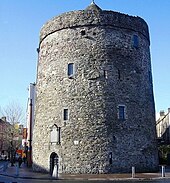
Waterford is a city in County Waterford in the south-east of Ireland. It is located within the province of Munster. The city is situated at the head of Waterford Harbour. It is the oldest and the fifth most populous city in the Republic of Ireland. It is the ninth most populous settlement on the island of Ireland. According to the 2022 census, 60,079 people live in the city, with a wider metropolitan population of 82,963.

Christ Church Cathedral, more formally The Cathedral of the Holy Trinity, is the cathedral of the United Dioceses of Dublin and Glendalough and the cathedral of the ecclesiastical province of the United Provinces of Dublin and Cashel in the (Anglican) Church of Ireland. It is situated in Dublin, Ireland, and is the elder of the capital city's two medieval cathedrals, the other being St Patrick's Cathedral.

Wood Quay is a riverside area of Dublin that was a site of Viking settlement. It is now the location of the Dublin City Council offices.
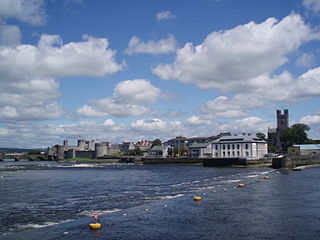
King's Island is an area of central Limerick, Ireland. The area is often referred to colloquially as The Island and consists of two distinct areas, Englishtown and St Mary's Park. The historical city of Limerick known as Englishtown is located on the southern end and St Mary's Park; a local authority housing estate is located on the northern end.
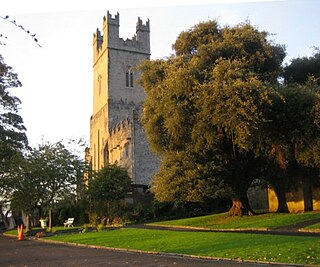
Saint Mary's Cathedral, Limerick, is a cathedral of the Church of Ireland in Limerick, Ireland, which is dedicated to the Blessed Virgin Mary. It is in the ecclesiastical province of Dublin. Previously the cathedral of the Diocese of Limerick, Ardfert and Aghadoe, it is now one of six cathedrals in the Diocese of Tuam, Limerick and Killaloe.
The architecture of Ireland is one of the most visible features in the Irish countryside – with remains from all eras since the Stone Age abounding. Ireland is famous for its ruined and intact Norman and Anglo-Irish castles, small whitewashed thatched cottages and Georgian urban buildings. What are unaccountably somewhat less famous are the still complete Palladian and Rococo country houses which can be favourably compared to anything similar in northern Europe, and the country's many Gothic and neo-Gothic cathedrals and buildings.

Waterford city is situated in south eastern Ireland, on the river Suir [pronounced Shure] about seventeen miles (27 km) from where the river enters the sea.

Waterford Treasures is a group of museums in and related to the city of Waterford in Ireland. It consists of four entities branded as museums and a historic building, the former Bishop's Palace, all located in adjacent, and another historic building, Reginald's Tower, which contains the Waterford Viking Museum. All these are located in the Viking Triangle. The collections includes the 14th Century Waterford Charter Roll. Associated with Waterford Treasures are a cafe, and the Epic Walking Tour and the King of the Vikings Virtual Reality Adventure.

Fréjus Cathedral is a Roman Catholic church located in the town of Fréjus in the Var department of Provence, southeast France, and dedicated to Saint Leontius of Fréjus.
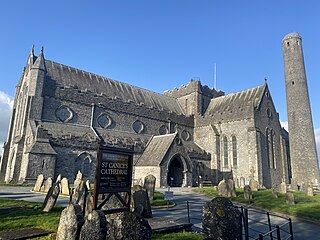
St Canice's Cathedral, also known as Kilkenny Cathedral, is a cathedral of the Church of Ireland in Kilkenny city, Ireland. It is in the ecclesiastical province of Dublin. Previously the cathedral of the Diocese of Ossory, it is now one of six cathedrals in the United Dioceses of Cashel and Ossory.

The Cathedral of Saint Domnius, known locally as the Sveti Dujam or colloquially Sveti Duje, is the Catholic cathedral in Split, Croatia. The cathedral is the seat of the Archdiocese of Split-Makarska, currently headed by Archbishop Zdenko Križić. The Cathedral of St. Domnius is a complex of a church, formed from an Imperial Roman mausoleum, with a bell tower; strictly the church is dedicated to the Virgin Mary, and the bell tower to Saint Domnius. Together they form the Cathedral of St. Domnius.

Christ Church Cathedral, Waterford, or more formally, the Cathedral of The Holy Trinity, Christ Church, is a cathedral of the Church of Ireland in Waterford City, Ireland. It is in the ecclesiastical province of Dublin. Previously the cathedral of the Diocese of Waterford, it is now one of six cathedrals in the United Dioceses of Cashel and Ossory.

Architecture in Cardiff, the capital city of Wales, dates from Norman times to the present day. Its urban fabric is largely Victorian and later, reflecting Cardiff's rise to prosperity as a major coal port in the 19th century. No single building style is associated with Cardiff, but the city centre retains several 19th and early 20th century shopping arcades.

The French Church, also known as Greyfriars Abbey, is a former Franciscan friary which was built in 1241 on what is now Greyfriars and Baileys New Street, Waterford in Ireland. At the entrance to the ancient church stands a monument to Luke Wadding, a seventeenth-century Waterford-born priest. This friary was one of the first to be built in Ireland, being founded by the Anglo-Norman Knight Sir Hugh Purcell.
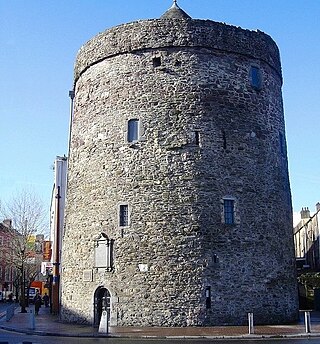
Reginald's Tower is a historic tower in Waterford, Munster, Ireland. It is located at the eastern end of the city quay. The tower has been in usage for different purposes for many centuries and is an important landmark in Waterford and an important remnant of its medieval urban defence system. It is the oldest civic building in Ireland and it is the only urban monument in Ireland to retain a Norse or Viking name.
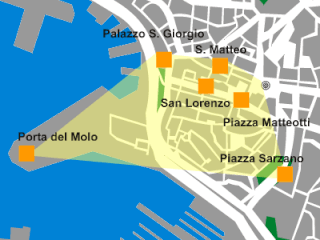
Molo is a neighbourhood in the old town of the Italian city of Genoa. It was one of the six sestieri of ancient Genoa. At present is part of the Genoa's city Municipio I.
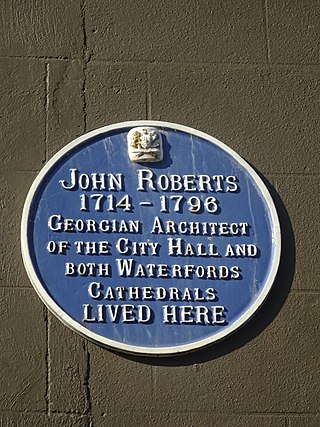
John Roberts was an Anglo-Irish architect of the 18th century, working in the Georgian style. Born in the city of Waterford, he is best known for the buildings he designed in that city.

The Irish Museum of Time is a horological museum in Waterford, the Republic of Ireland. It is situated in the Waterford Viking Triangle, an area with various historical sites and museums. It opened on 14 June 2021. It owns about 600 timepieces. It is a part of the Waterford Treasures, along with other five museums.


